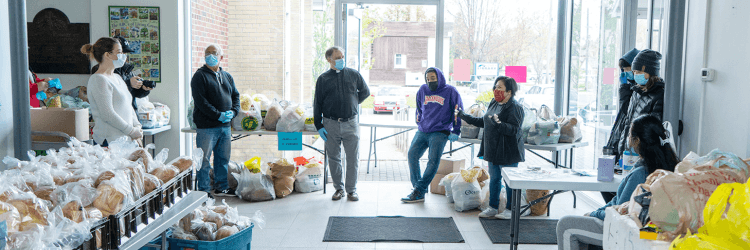
Not knowing where your next meal may come from can be an extremely stressful experience.
During the COVID-19 pandemic, a recent Statistics Canada report found that individuals in households that experience moderate food insecurity were nearly three times as likely to report moderate or severe anxiety symptoms within the previous 30 days.
For those living in households with severe food insecurity, the situation was even more dire. These respondents were more than seven times more likely to report symptoms of moderate or severe anxiety, compared to food secure households.
Since last March, the pandemic has profoundly impacted the economic status of many Canadians, with millions experiencing job losses or reduced work hours. Daily Bread’s Hunger Lives Here report found that 76 per cent of new clients began accessing food banks due to COVID-19, primarily because of job loss or a reduction in hours. Unsurprisingly, the Statistics Canada study found that moderately and severely food insecure Canadians facing serious financial constraints reported significantly poorer mental health outcomes in the early pandemic period than those in food-secure households.
Certain population groups are more likely to be food insecure, such as lone-parent households or individuals who rely on social assistance as their main source of income, individuals who rent their home, and those who are at risk of being evicted. As a result, poor mental health outcomes are more pronounced amongst these groups as they attempt to navigate the chronic stress of living in financial and food insecurity.
Food banks see the mental health impacts of food insecurity each day. Sharmini Fernando, the Executive Director at Syme Woolner Neighourhood and Family Centre noted that, “There is a significant group of people whose health issues are further magnified because they have lost their income, their housing or their general wellbeing. Many of our clients who utilize the food bank services fall into the above category and are struggling to make ends meet. They were struggling before but COVID has taken them further down the scale of survival.”
She added, “Food banks are an important ‘stop-gap’ for emergencies, but they are not the answer. People need jobs that pay a decent wage with sick time benefits and supports. If we can get to that place where people have decent jobs, renters are not evicted but rather protected during hard times and if families are given a basic income to survive, the mental health outcomes would be greatly improved.”
To support low-income households and those experiencing food insecurity, we need to think about the immediate need created by COVID-19 as well as longer-term economic impacts that are expected to lead to poorer mental health outcomes.
To learn more about our advocacy efforts and policy submissions for all levels of government, click here.